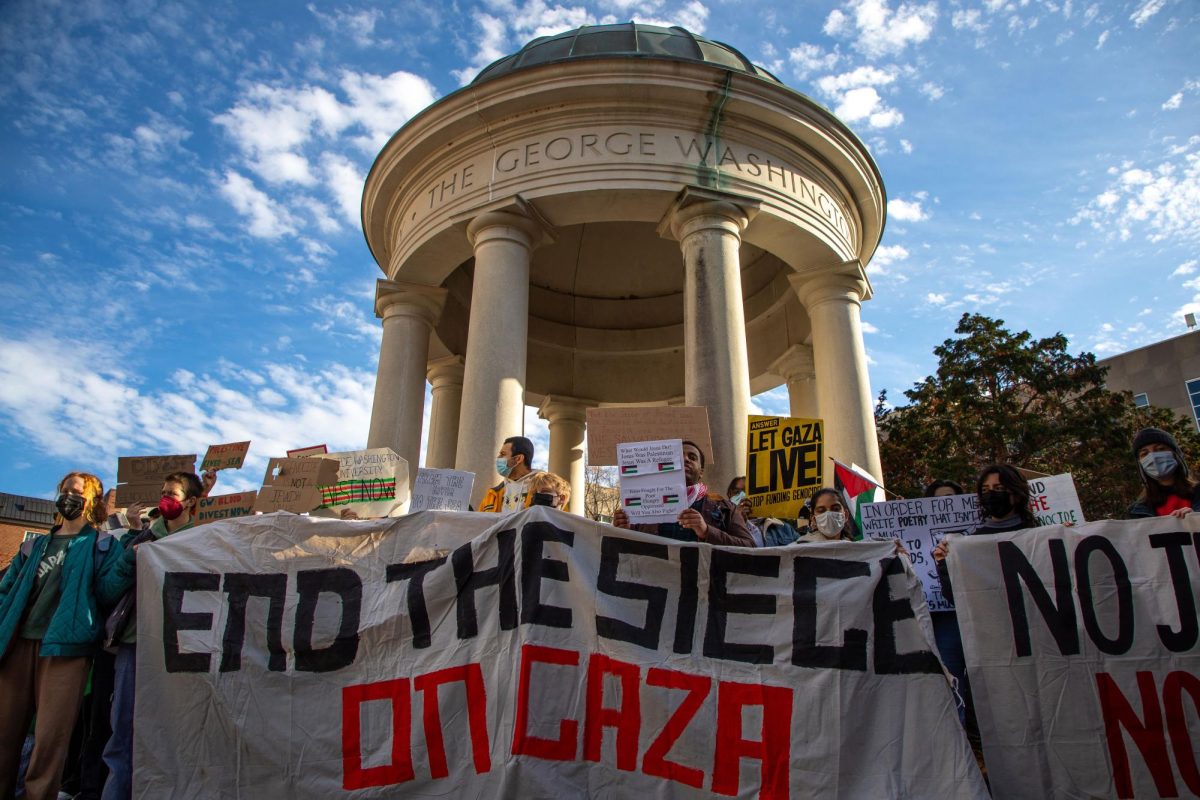GW entered a new chapter in 2023 as the community welcomed new leadership and branding, but not without persistent influence from local and international conflict.
The University launched itself into a new era, underscored by the inauguration of the University’s first female president, the replacement of the centuries-old Colonials moniker after years of student pressure, and a new prestigious research status. Students marched along the streets of Foggy Bottom and the District, rallying against the arming of some GW Police Department officers, support for Israel and demanding the reinstatement of Students for Justice in Palestine at GW.
Here’s a look at the top stories at GW from 2023:
Wrighton exits pivotal term, Granberg takes the helm
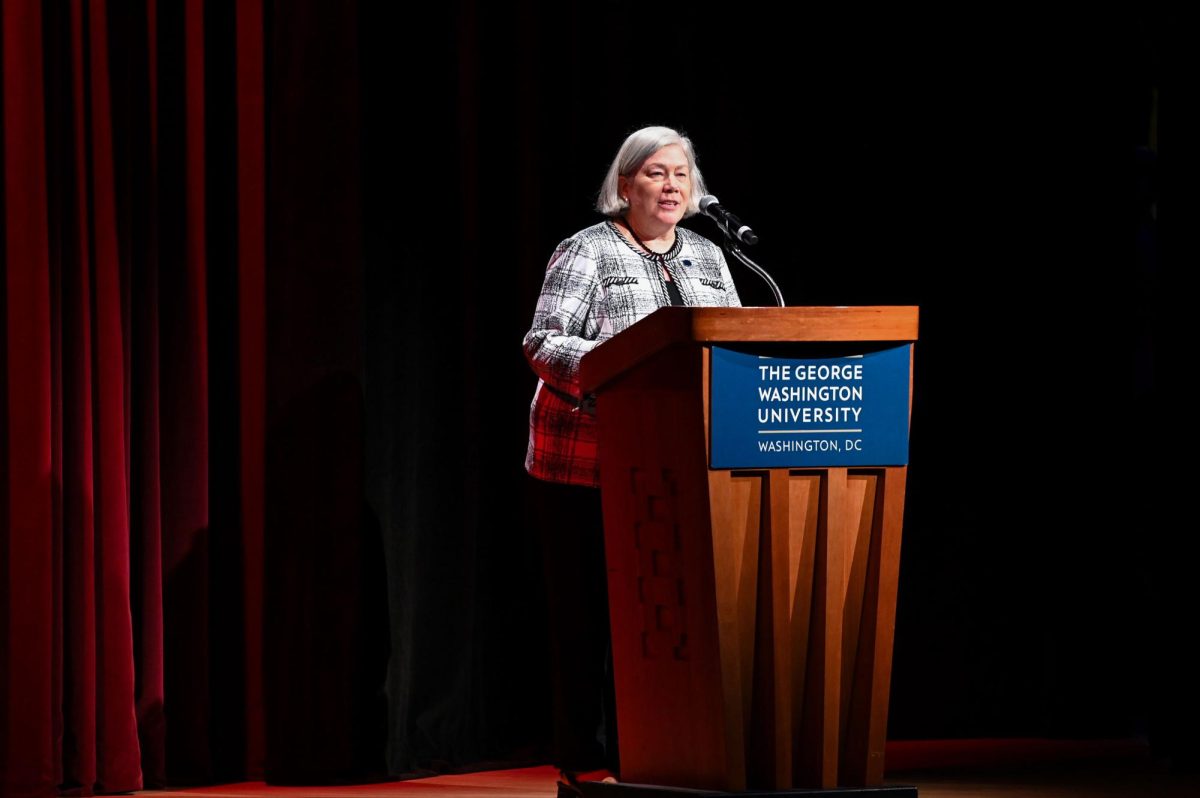
To lead GW into its third century, officials named former provost and senior vice president for academic affairs at Rochester Institute of Technology Ellen Granberg as the 19th University president in January. Granberg began her permanent tenure in July and has since said she will prioritize mitigating the Medical Faculty Associates’ $200 million debt crisis while expanding the 14 endowed professorships that former interim University President Mark Wrighton announced in September 2022. Throughout the first few months of her term, faculty and staff said Granberg had leveraged community input in strategic planning conversations and faculty research.
In September, she kicked off a 10-city national tour to discuss GW’s future with alumni and donors to influence institutional planning. But most notably, Granberg’s term has been marked by her response to the war in the Gaza Strip, which has drawn criticism on all sides of the conflict as supporters of Israel have called on her to act against antisemitism on campus and supporters of Palestine have questioned her dedication to free speech.
Israel-Hamas war reverberates on campus
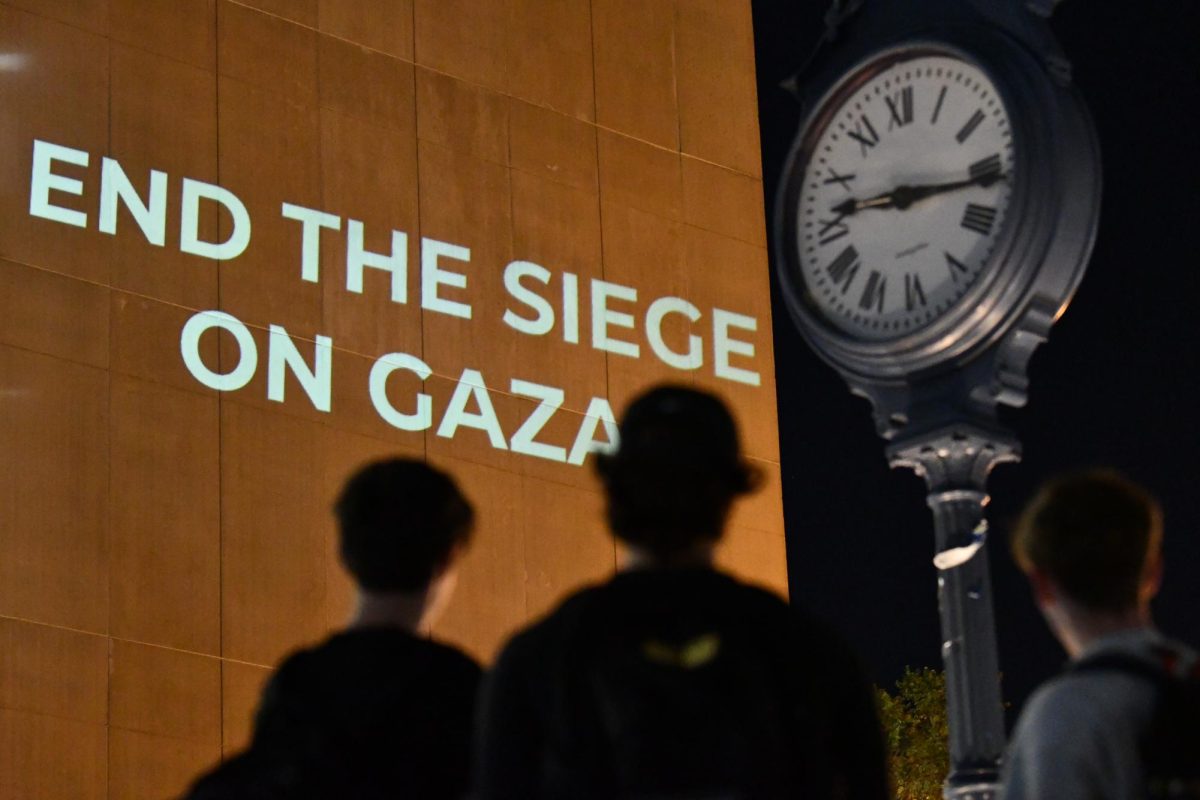
After Israel’s government declared war on Hamas following the fundamentalist Palestinian group’s Oct. 7 attack, GW and District-wide groups organized protests, vigils and walkouts — some in support of Palestinians and others to commemorate the Israeli people killed and taken hostage. But since the war broke out, pro-Palestinian vigils and protests have intensified on campus as Israel continues its assault on the Gaza Strip.
National controversy arose when four student demonstrators from Students for Justice in Palestine at GW projected phrases protesting the war onto Gelman Library in October, including “End the siege on Gaza,” “Glory to our martyrs,” and “GW the blood of Palestine is on your hands.” The following day, Granberg called the statements antisemitic amid intense national pressure to condemn and punish SJP, including a letter co-signed by seven of GW alumni serving in the House of Representatives.
In November, University officials suspended the Students for Justice in Palestine chapter from hosting and participating in on-campus activities for at least 90 days after a closed-door review of the group’s projections on Gelman Library. Officials found the projections violated GW policies, including Gelman Library’s Building Use Guidelines and the University’s policy against noncompliance, and prohibited the organization from displaying any public messages on campus until the end of the academic year.
About 100 students gathered in Kogan Plaza days after the suspension to protest the University’s decision, eventually marching to Granberg’s F Street House. More than 1,000 alumni have also cosigned a letter — which students have delivered to Granberg’s house — asking GW to reinstate SJP.
GWPD also investigated the tearing down of posters depicting Israeli hostages in the GW Hillel building in November, temporarily suspending and removing the student accused of the act the next week. At the same time, University officials barred an individual from campus after the person engaged in harmful, verbal misconduct” toward a Muslim student on Oct. 7.
GW completes switch to dining halls

GW departed from its former dining system that made students spend their meal plan dollars at local restaurants and groceries. Now, after completing the construction of buffet-style dining halls, students use meal swipes to eat.
After Thurston and District House dining halls opened late last year, the all-you-can-eat buffet in Shenkman Hall opened in January, completing the revamp of GW dining facilities, which are run by higher education dining hall provider Chartwells. GW added two new Chartwells-operated vendors — fried chicken vendor Absurd Bird and Indian eatery Chaat House — to the newly renovated University Student Center this fall.
Board of Trustees chooses to arm GWPD officers
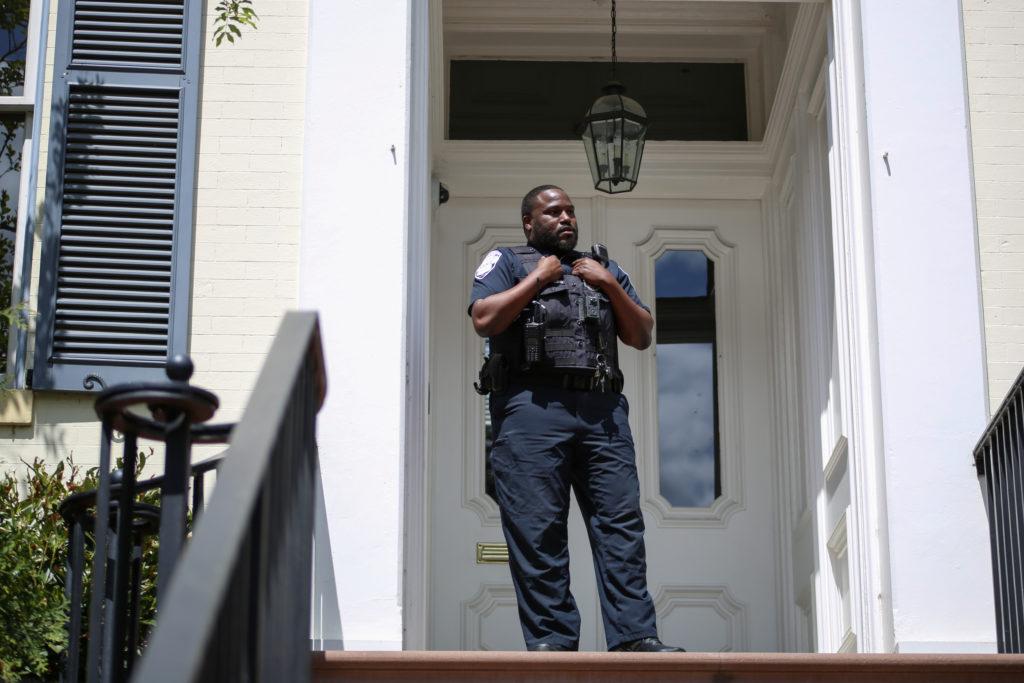
Days after the Board Trustees directed officials to begin arming roughly 20 of GWPD’s 50 top officers with 9 mm handguns in May, at least 150 students across about 20 student organizations marched to F Street House demanding officials reverse their decision, chanting “No justice, no peace, no racist police,” and “We keep us safe.”
Hundreds of faculty across 11 GW schools and colleges signed a letter raising concerns over the lack of community input on the decision, citing examples of armed campus officers using violence against students of color.
GWPD armed its top two officers — GWPD Chief James Tate and Captain Gabe Mullinax — in early September with plans to arm four additional officers by the end of the month. Faculty senators passed a resolution in October demanding the data officials used to support their decision to arm officers, including responses to the community feedback form GWPD released in June.
Granberg said at the senate’s December meeting that GWPD’s Safety Advisory Committee of students, faculty, staff and community members will create a report with data on arming and community safety, and the next group of supervisory officers is completing training requirements for carrying a firearm.
Revolutionaries replace the Colonials moniker
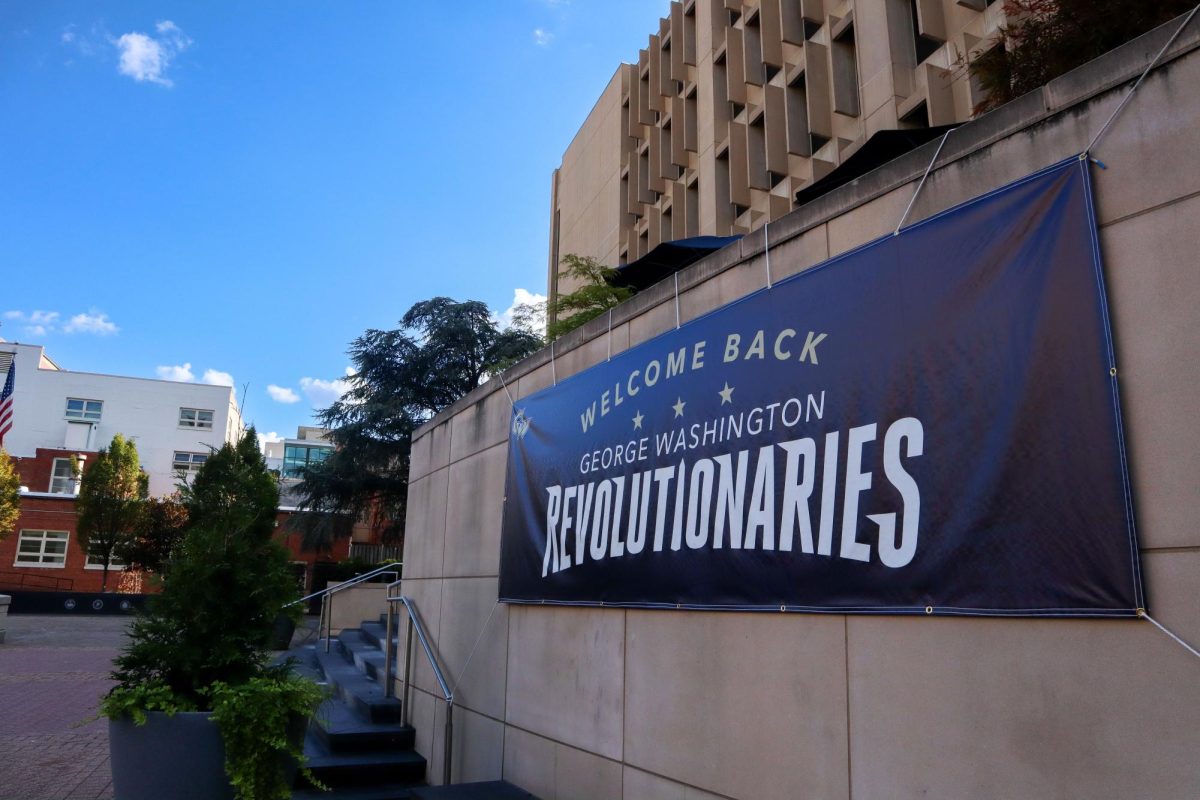
Officials announced the selection of the Revolutionaries moniker to represent GW’s athletic teams and branding in May, tying off a yearlong community engagement period for feedback on moniker options and officially leaving behind the century-old Colonials moniker. Students, faculty, staff and alumni participated in ranking activities and focus groups and submitted suggestions through online forms to aid officials’ decision. From February to March, officials narrowed down a list of 10 moniker options to four finalists: Ambassadors, Blue Fog, Revolutionaries and the Sentinels.
GW’s mascot – George, who dons a George Washington costume and colonial hat – will continue to represent the University at athletic and community events.
More than a dozen community members said the Revolutionaries moniker will kickstart change at GW. But some said the new moniker resembles the Colonials, which students said glorified the legacy of colonialism, slavery and racial discrimination.
GW joins prestigious academic organization

The University gained membership into the Association of American Universities in June after officials highlighted membership as a top priority in the Presidential Profile, which outlined the qualities and goals for the University’s 19th president and was released in October 2022. The AAU is a group of 70 “premier” research institutions, including peer schools Boston, Tufts and New York Universities that meet regularly to discuss best practices for employing cited faculty, gaining research funding and lobbying for educational policy.
In September, Granberg said she attended an orientation for university leaders who recently accepted offers to join the AAU and that the group collects higher education data only accessible to member universities.
Escaped murder suspect draws questions on emergency preparedness
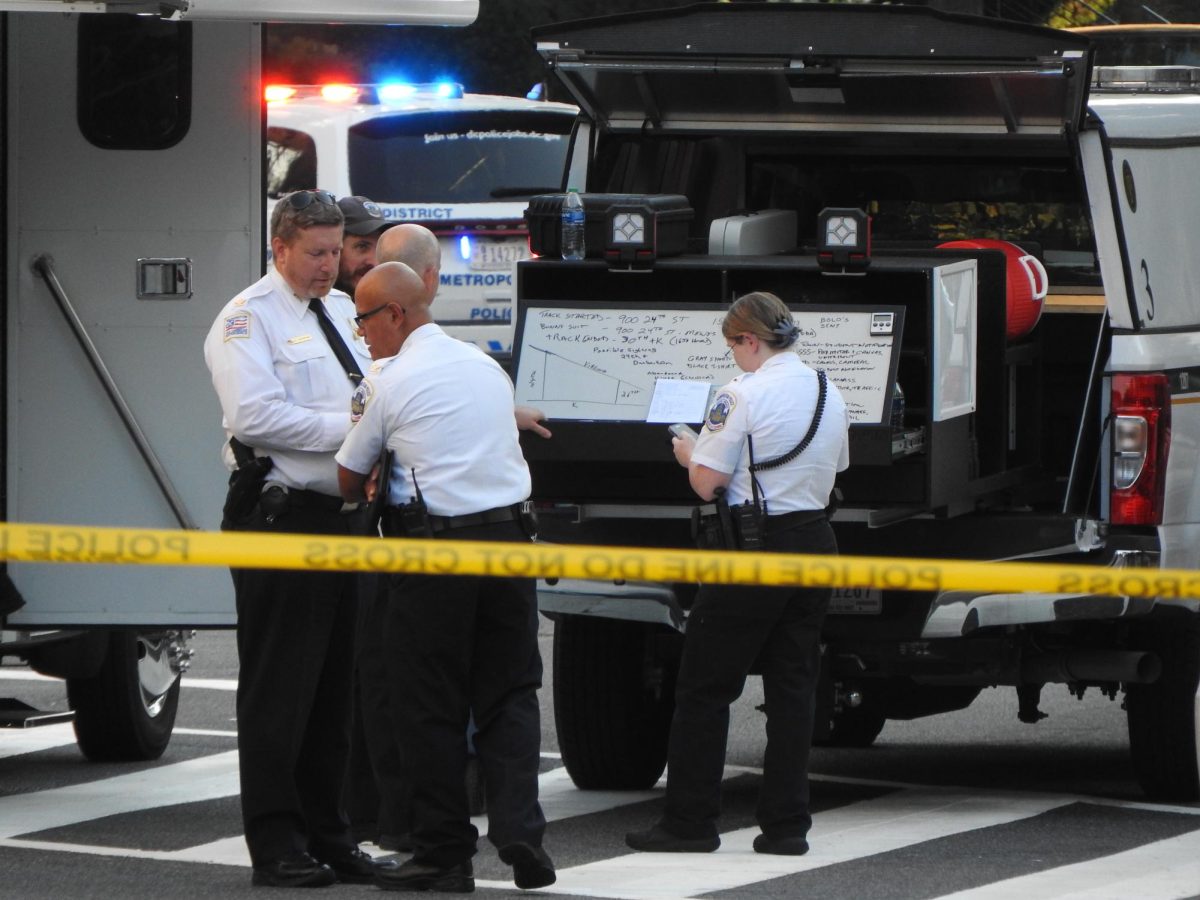
The Metropolitan Police Department, Secret Service, U.S. Marshals and K-9 squads descended on Foggy Bottom in September in search of homicide suspect Christopher Haynes, causing University officials to launch a four-hour shelter-in-place order. Police apprehended Haynes in Oxon Hill, Maryland in October.
University faculty and students reported confusion surrounding the shelter-in-place order, relying on instinct instead of established GW policy. After collecting feedback on the protocol, GW will now denote four protective actions —shelter, secure, lockdown and evacuate—in emergency situations, issuing additional communications on a case-by-case basis.
Residents spar over delayed shelter in Ward 2
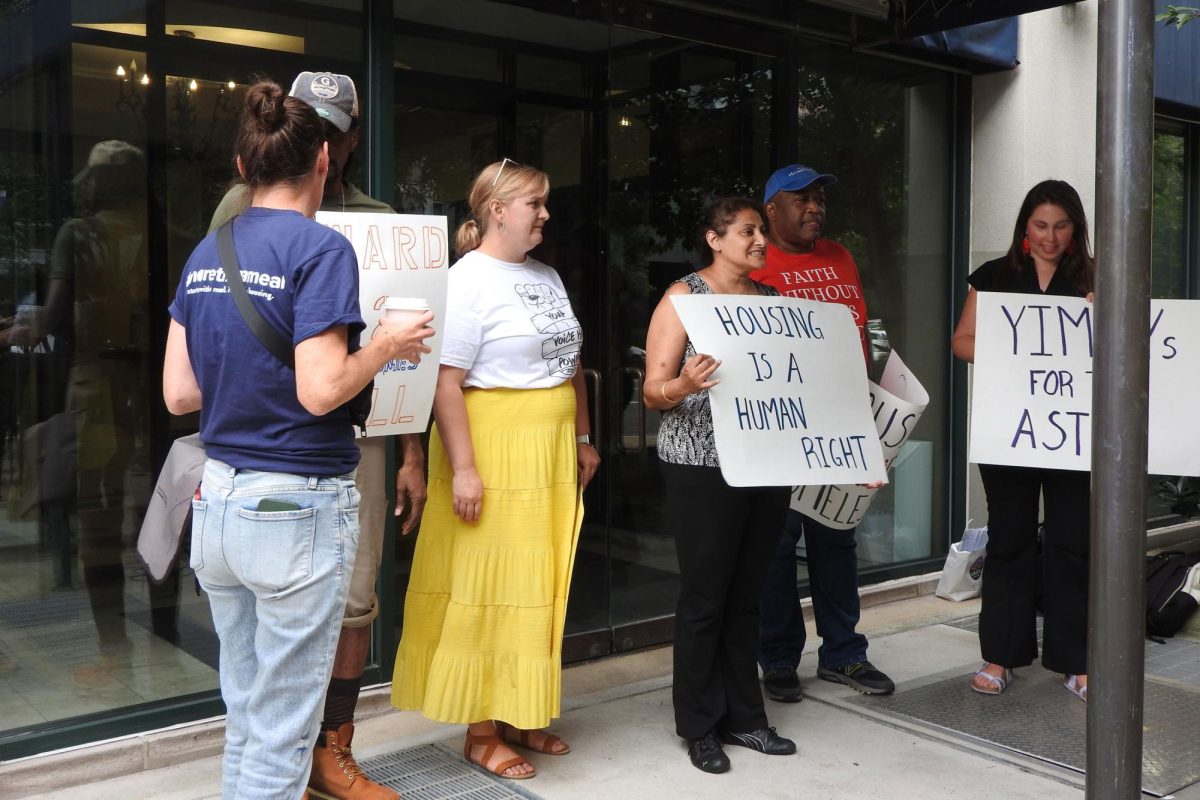
The D.C. government purchased The Aston from GW for $27.5 million, with the D.C. Council approving the contract in July. A local governing body, the Foggy Bottom and West End Advisory Neighborhood Commission supported the D.C. Department of Human Services’ proposal to convert the former GW residence hall into a shelter for unhoused and medically vulnerable individuals, allowing its residents, who may have temporary medical conditions, privacy.
An unincorporated group of locals filed a lawsuit in July, then another in October, aiming to slow the conversion of The Aston. Community members rallied in support of the shelter in August.
DHS officials also delayed the opening of The Aston as a homeless shelter until this spring or summer, potentially exacerbating problems within D.C.’s housing system.


